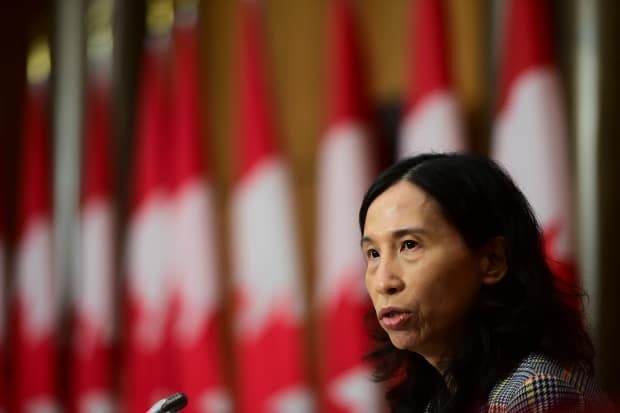Canada could be seeing the start of a variant-driven 4th wave, chief health officer warns

Canada's top health officials are warning that Canada could be seeing the beginning of a fourth COVID-19 wave driven by the more infectious delta variant.
The seriousness of the pandemic's resurgence will depend largely on vaccination coverage — especially as provinces move forward with reopening plans — Chief Public Health Officer Dr. Theresa Tam said today.
"I think we are in a slightly precarious period at the moment, in between these people trying to get the vaccines in and reopening," Tam said.
"As soon as that balance is tipped, and it wouldn't take very much with a highly transmissible virus, you're going to see an uptick in cases."
Health officials are looking at the 18 to 39 age demographic as the key to addressing a possible fourth wave.
Roughly 70 per cent of that age group has received a vaccine shot, but Tam said that number needs to rise to 80 per cent in order to avoid overwhelming hospitals.
"This could significantly reduce the size and impact of the resurgence," she said.
Delta leading to increased spread in some regions
While most regions are not experiencing a spike in cases at this point, Tam said some are starting to show signs of increased virus activity.
B.C. declared a COVID-19 outbreak in the Central Okanagan after a rapid rise in cases in the region and is reimposing a local mask mandate, as well as other public health measures.
B.C. Provincial Health Officer Dr. Bonnie Henry said the spread of the delta variant in the area is alarming, but she believes the new measures will help flatten the spike in numbers.
Although its case numbers are lower overall now, Alberta is seeing the virus spread faster than it did during the peak of the third wave, with case counts now being driven by the more infectious variant.
WATCH | Alberta reduces COVID-19 measures, cites need to focus on all respiratory infections:
Despite the faster spread, Alberta recently announced that those who test positive for COVID-19 will no longer be required to enter isolation starting August 16.
Tam said that while it's up to provinces to decide on their own health measures, she still strongly encouraged people who contract COVID-19 to self-isolate.
"I would ask any individual who is diagnosed with COVID-19, or you think you may have it, please isolate," Tam said.
'Cautious approach' to reopening
The Public Health Agency of Canada released data today that show fully vaccinated Canadians have accounted for less than one per cent of new COVID-19 cases and hospitalizations since December.
Of the entire population eligible to receive a vaccine, 81 per cent have received one dose and 66 per cent are fully vaccinated.

But Tam said provinces need to take a "cautious approach" to reopening — even in regions where the spread hasn't been increasing — to allow more for more vaccine coverage.
"If cases increase ... it could mean that reopening is proceeding too quickly before enough people have developed immunity through vaccination," she said.
Tam pointed to the U.K., which — despite relatively high vaccination rates — still experienced a resurgence driven by the delta variant.
Tam said she'd like to see more than 80 per cent of the population fully vaccinated but she's hoping uptake will be as robust as possible.

